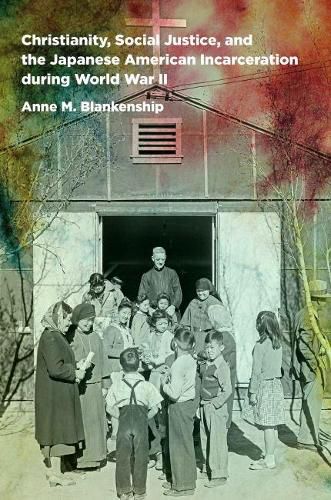Readings Newsletter
Become a Readings Member to make your shopping experience even easier.
Sign in or sign up for free!
You’re not far away from qualifying for FREE standard shipping within Australia
You’ve qualified for FREE standard shipping within Australia
The cart is loading…






Anne M. Blankenship’s study of Christianity in the infamous campswhere Japanese Americans were incarcerated during World War II yieldsinsights both far-reaching and timely. While most Japanese Americansmaintained their traditional identities as Buddhists, a sizeable minorityidentified as Christian, and a number of church leaders sought to ministerto them in the camps. Blankenship shows how church leaders were forced toassess the ethics and pragmatism of fighting against or acquiescing to whatthey clearly perceived, even in the midst of a national crisis, as an unjustsocial system. These religious activists became acutely aware of the impact ofgovernment, as well as church, policies that targeted ordinary Americans ofdiverse ethnicities.
Going through the doors of the camp churches and delving deeply intothe religious experiences of the incarcerated and the faithful who aidedthem, Blankenship argues that the incarceration period introduced newsocial and legal approaches for Christians of all stripes to challenge the constitutionalityof government policies on race and civil rights. She also showshow the camp experience nourished the roots of an Asian American liberationtheology that sprouted in the sixties and seventies.
$9.00 standard shipping within Australia
FREE standard shipping within Australia for orders over $100.00
Express & International shipping calculated at checkout
Anne M. Blankenship’s study of Christianity in the infamous campswhere Japanese Americans were incarcerated during World War II yieldsinsights both far-reaching and timely. While most Japanese Americansmaintained their traditional identities as Buddhists, a sizeable minorityidentified as Christian, and a number of church leaders sought to ministerto them in the camps. Blankenship shows how church leaders were forced toassess the ethics and pragmatism of fighting against or acquiescing to whatthey clearly perceived, even in the midst of a national crisis, as an unjustsocial system. These religious activists became acutely aware of the impact ofgovernment, as well as church, policies that targeted ordinary Americans ofdiverse ethnicities.
Going through the doors of the camp churches and delving deeply intothe religious experiences of the incarcerated and the faithful who aidedthem, Blankenship argues that the incarceration period introduced newsocial and legal approaches for Christians of all stripes to challenge the constitutionalityof government policies on race and civil rights. She also showshow the camp experience nourished the roots of an Asian American liberationtheology that sprouted in the sixties and seventies.